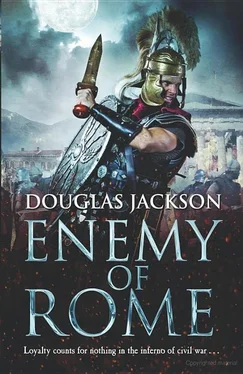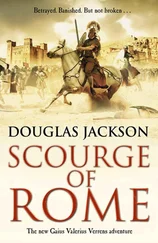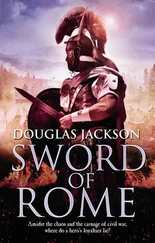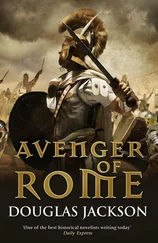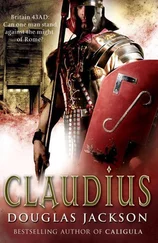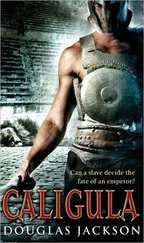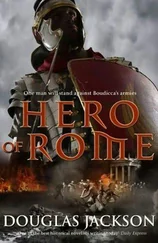Douglas Jackson - Enemy of Rome
Здесь есть возможность читать онлайн «Douglas Jackson - Enemy of Rome» весь текст электронной книги совершенно бесплатно (целиком полную версию без сокращений). В некоторых случаях можно слушать аудио, скачать через торрент в формате fb2 и присутствует краткое содержание. Год выпуска: 2014, ISBN: 2014, Издательство: Bantam Press, Жанр: Исторические приключения, на английском языке. Описание произведения, (предисловие) а так же отзывы посетителей доступны на портале библиотеки ЛибКат.
- Название:Enemy of Rome
- Автор:
- Издательство:Bantam Press
- Жанр:
- Год:2014
- ISBN:9781448127696
- Рейтинг книги:4 / 5. Голосов: 1
-
Избранное:Добавить в избранное
- Отзывы:
-
Ваша оценка:
- 80
- 1
- 2
- 3
- 4
- 5
Enemy of Rome: краткое содержание, описание и аннотация
Предлагаем к чтению аннотацию, описание, краткое содержание или предисловие (зависит от того, что написал сам автор книги «Enemy of Rome»). Если вы не нашли необходимую информацию о книге — напишите в комментариях, мы постараемся отыскать её.
Enemy of Rome — читать онлайн бесплатно полную книгу (весь текст) целиком
Ниже представлен текст книги, разбитый по страницам. Система сохранения места последней прочитанной страницы, позволяет с удобством читать онлайн бесплатно книгу «Enemy of Rome», без необходимости каждый раз заново искать на чём Вы остановились. Поставьте закладку, и сможете в любой момент перейти на страницу, на которой закончили чтение.
Интервал:
Закладка:
A man in the tight-linked mail of an auxiliary officer advanced from the waiting group with his sword held across the palms of both hands in a gesture of surrender. He brushed past the old man and knelt before Varus. ‘Oppius Lucanus, commanding First Alpinorum, pledges his sword and those of his cohort to the rightful Emperor, Titus Flavius Vespasian.’
‘What is your strength?’ Varus demanded.
‘Four hundred and forty effectives, twenty-four sick.’
‘Very well, I may have need of infantry. Have the fighting men ready and supplied with whatever rations they can carry. We leave at first light tomorrow.’ He saw the momentary relief on the magistrate’s face and swiftly disabused him of any notion that his city and its contents were being overlooked. ‘They will be replaced by one of my cavalry cohorts. You will find stabling for their horses and provide food and drink for the men. From now on, all movement to and from the city, including from the port, will require the sanction of the commander. Is that clear?’ Ponticus bowed his head. ‘In addition, the people of Aquileia will supply fodder for six thousand horses and three days’ rations for the men of my column. Arrange it with my quartermasters. My officers will dine in the city tonight. Ensure that the hospitality and entertainment is the best Aquileia can offer.’ The old man backed away and the delegation moved off towards the city, casting wary glances back at Varus and talking animatedly among themselves. Valerius reflected that Marcus Antonius Primus didn’t seem to have passed on Vespasian’s preferred strategy of making allies of those who accepted his rule. Fear was all very well, but experience had taught him that fear was a transitory emotion, and when it faded it was all too often replaced by hatred and defiance. Shame could be a great motivator for a man who had bent the knee unwillingly. At best, Varus had ensured there would be resentment in this city that held the key to his supply line; at worst …
But the auxiliary commander seemed happy with the outcome. He turned to Valerius with a satisfied smile. ‘Well, that was simple enough.’
Later, Valerius and Serpentius stood on the city walls watching lines of carts rattle and squeak their way out towards the nearby auxiliary encampments, their beds forced low over the axles by the weight of fodder and provisions for the thousands of cavalry surrounding the city.
‘Poor bastards,’ the Spaniard grunted. ‘They’ll never see a bent sestertius for that, and there’ll be empty bellies this winter.’
Valerius only shrugged. ‘Aquileia got off lightly compared to some.’ He remembered the burned-out settlements they’d encountered in Raetia on their mission to contact Vitellius, the victims of Aulus Caecina Alienus’s terror policy.
‘And now we wait for the legions to catch up?’
‘Varus has orders to push ahead and scout towards the Padus.’ A shout from below distracted Valerius. He looked down to see two drunken cavalrymen fighting over a woman, rolling in a gutter as she raised her skirts to piss in it. Varus had sent two squadrons into the town to add weight to his quartermasters’ authority, but it appeared some of them had given their officers the slip. As the cries faded the scent of woodsmoke drifted in from the cooking fires that dotted the surrounding fields and they could hear some homesick auxiliary crooning a mournful ballad in his own tongue. ‘My guess is that we’ll probe along the Via Postumia until we either reach the river or come up against enemy cavalry. What I don’t understand is why Valens or Caecina isn’t already here. They’re not fools. If they’d garrisoned Aquileia with even one legion they could keep Primus bottled up in Pannonia indefinitely. It would give them time to bring up the rest of their forces and provide a secure base that could be supplied by sea if need be. We’d be outnumbered, the troops would soon become disheartened and our generals would look like fools. Every day Vitellius sits in Rome acting like an Emperor his validity grows and it makes Vespasian look like the usurper. Vespasian must act quickly, yet Vitellius’s generals aren’t doing anything to slow him down. It doesn’t make sense.’
They resumed their advance in the morning, the troops refreshed and resupplied, leaving a cohort of Syrian archers to hold Aquileia until Primus arrived with his main force. The column followed the Via Postumia west to the town of Opitergium, which declared for Vespasian as soon as they heard the sound of Varus’s trumpets. By mid-afternoon they had reached Patavium, a substantial city between the Via Postumia and the sea, and their first major challenge. Here, the residents were as willing to talk as those of Aquileia, but there was no rush to surrender. The town had a substantial garrison of Gaulish auxiliaries who would make the attacking of it a costly affair, particularly for cavalry without supporting artillery. Varus, confident as ever in his own abilities, was certain he could lure the city council to the Flavian cause, but it would take time and he was keenly aware they still hadn’t made contact with the armies of Vitellius. Valerius watched his growing impatience as the interminable negotiations continued at a requisitioned villa outside the city walls. He wasn’t surprised when the young cavalry commander drew him aside during a lull in the talks.
‘It is important that Patavium declares for Vespasian, but equally so that we discover the enemy’s strength this side of the Padus,’ Varus said with heavy emphasis.
‘You do not have to be so coy with me, Arrius.’ Valerius met the unsubtle hint with a wry smile. ‘If you want me to take a patrol ahead while you bore the Patavians to death all you have to do is say so.’
‘I just thought that Spanish wolf of yours needed some exercise,’ the prefect grinned. ‘I can let you have two alae , three if you think it necessary. That should be enough to make any opposing force you meet think twice before taking you on. If you make contact, don’t get involved. Withdraw here and we’ll wait for Primus to reinforce us.’
Valerius chose the spearmen of the First Cananefatium, a unit of heavy cavalry from the marshy wastelands of the Germania coast, and the First Hispanorum Aravacorum, recruited from the Arevaci, a warrior people of northern Hispania. These were alae miliariae , nominally a thousand strong, but in reality each cavalry wing could put fewer than eight hundred men in the saddle, so he bolstered his force with a wing of Thracian archers. They rode out in the early afternoon, skirting the mountains west of the city, and two hours later they approached Ateste, a colonia settled by retired veterans of Augustus’s legions fifty years earlier. Valerius reined in and studied the road ahead. He and Serpentius rode at the head of the Cananefates, with the unit’s red-bearded commander, Octavius. Valerius turned to the German. ‘What do you make of that?’
The town was little more than a shimmering blur in the distance, but the twinkle of the sun on metal betrayed what might be a military presence. ‘Could be trouble,’ the German agreed in a Latin thick with the guttural intonation of his native dialect. ‘We’ll know soon enough.’ Even as he spoke a scout galloped up and rattled out a report to his commander.
‘Soldiers,’ Octavius confirmed. ‘Infantry — auxiliaries or militia he thinks, judging by their war gear — but without cavalry support. No more than three centuries,’ he added, pre-empting Valerius’s question, ‘and they’re not in defensive positions. Arminus here says it looks as if they’re drawn up on parade.’
‘Then perhaps we should go and inspect them,’ Valerius suggested thoughtfully. ‘But we’ll send a couple of squadrons ready to flank them just in case they try anything foolish. I’ll take the first turma , you follow with the rest of the column.’
Читать дальшеИнтервал:
Закладка:
Похожие книги на «Enemy of Rome»
Представляем Вашему вниманию похожие книги на «Enemy of Rome» списком для выбора. Мы отобрали схожую по названию и смыслу литературу в надежде предоставить читателям больше вариантов отыскать новые, интересные, ещё непрочитанные произведения.
Обсуждение, отзывы о книге «Enemy of Rome» и просто собственные мнения читателей. Оставьте ваши комментарии, напишите, что Вы думаете о произведении, его смысле или главных героях. Укажите что конкретно понравилось, а что нет, и почему Вы так считаете.
